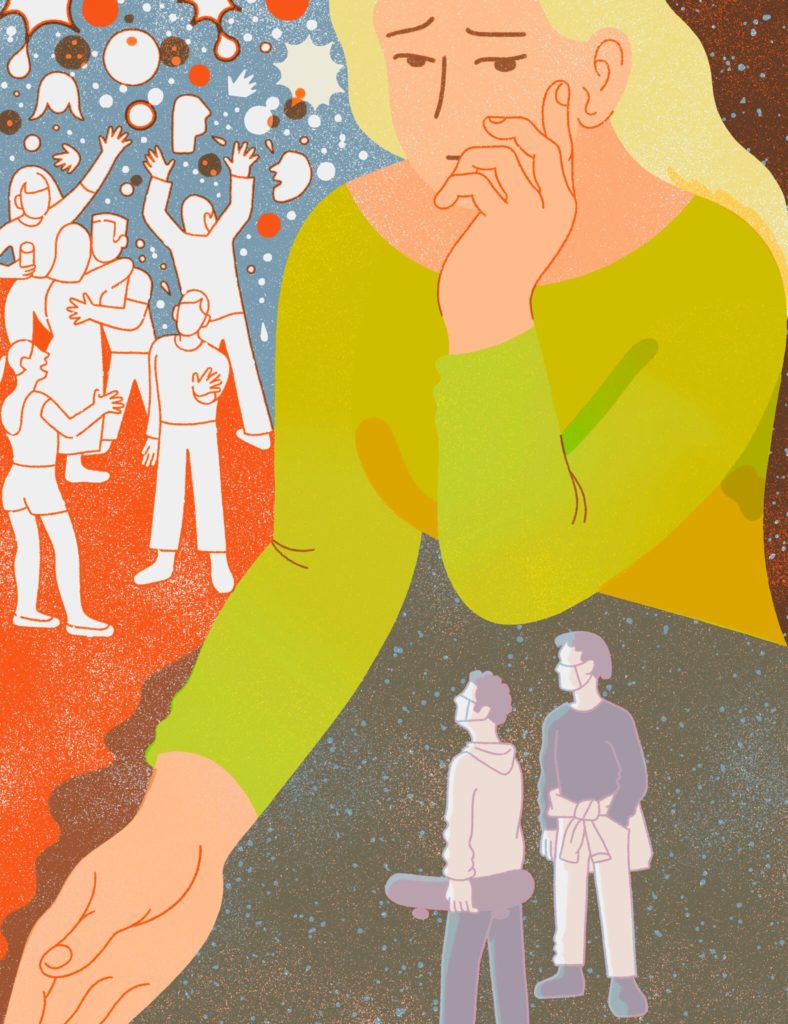One recent Thursday, I sent my 14- and 15-year-old boys off to the skate park near our house. I’m a parent who values a childhood lived outdoors. To that end, I’ve been a fairly free-range mom with my four kids, but as they left for the park, I gave them a warning that still feels foreign, even eight months into this pandemic. “Leave your masks on!” They both gave a nod of agreement and were off.
In the beforetime, rather than a mask reminder, I would have told them when I expected them home, and after that I would not have given the matter a thought until they walked back in the house minutes before dinner, sweaty and tired, but happy.
But in Covid times, the longer they are gone the more a nag begins to build in my mind. Are they really leaving those masks on? They are the only kids I’ve ever seen wearing them at that park. Are they going to be responsible, or will they bend to social pressure? Am I doing the right thing letting them go? Is this really safe? Am I going to catch Covid because I let them go skating?
The details may be different for each family, but these are the kinds of questions parents of teens are asking themselves right now. As a psychotherapist, I’m concerned. The most important task facing teenagers is to detach from their parents and become their own, separate beings. In a time that is supposed to be punctuated by detaching, redefining themselves and spending time with peers, a whole generation of teens are stuck at home with their parents.
I never imagined that I’d be having a moral dilemma around whether or not I should let my kids hang out with their peers. Before the pandemic, my house was usually full of extra kids. I know that the mind of a teenager is wired to pay greater respect to their peers than to their parents at this age, and my strategy has been, “If I can’t beat them, join them.” I tried to orient my home to be one where kids would feel welcome. I bought skate ramps off Craigslist. I had a trampoline and more wheeled riding things than my own family needed. Sure, my kids might be naturally pushing away from me at this age. But at least it could happen under my watch.
When schools shut down in the spring and I began to make my children follow social distancing guidelines, I saw the toll it took. They were lonely. They missed their friends. They were grieving missed school dances and birthday parties and sporting events. They were growing irritable with me, and with each other. Initially, they were FaceTiming and texting furiously with friends. But as time wore on, I noticed even that fell off. I think my kids, like many others, were experiencing a collective despair, and the lack of real face-time interaction was causing feelings of isolation and sadness, even while they were surrounded by family all day
Every parent is having to navigate risk, and what parents are comfortable with varies from family to family — which makes these decisions all the more difficult. My children are sure that I am making a bigger deal of Covid-19 than any other parent. I’m sure that I am not, but I’m also sure it feels as if I am to them. They are watching sleepovers, birthday parties and indoor movie nights happening on Instagram. They are aware that some of their peers have not experienced a drastic change in their social life or safety rules. Kids are congregating, just not at our house anymore. That loss is deeply felt by my kids. Thus, as a parent, I ebb and flow on what I will allow, and not allow. I feel guilty and loosen up. I feel nervous and tighten the reins.
Read the rest at The New York Times.

